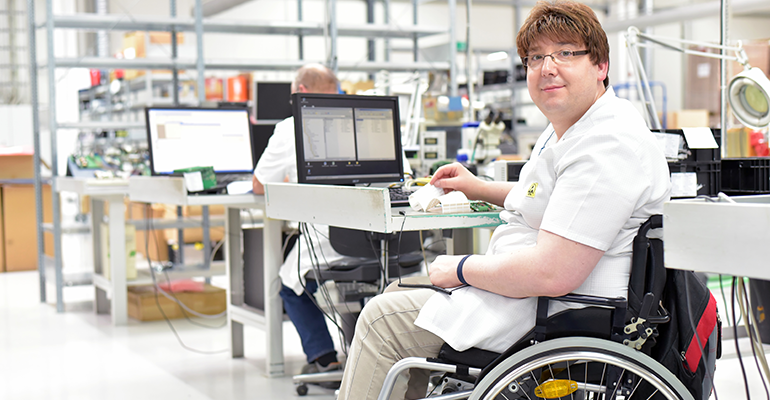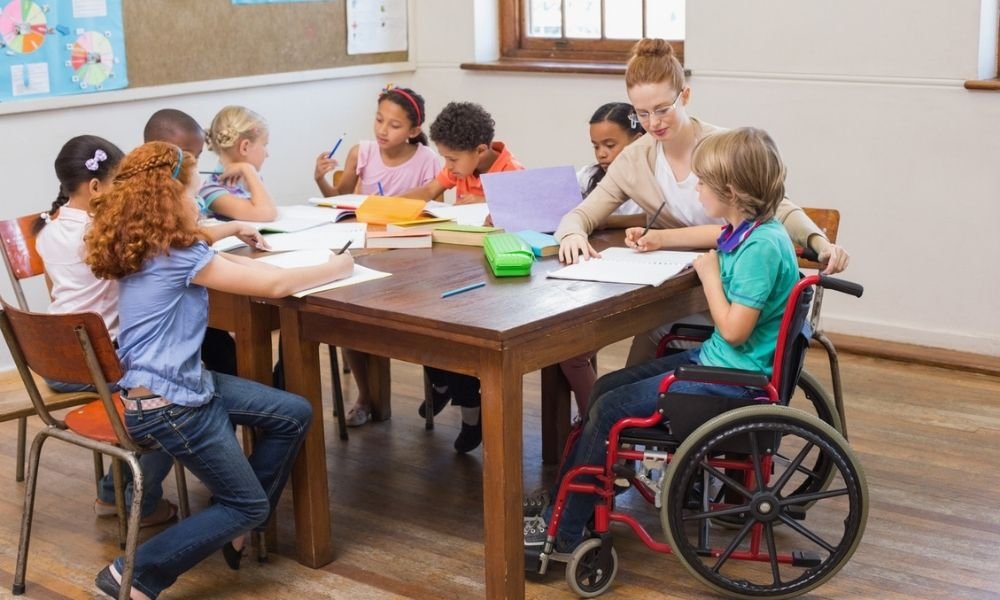Во 2023 година се навршуваат 60 години од делувањето на Републичкиот центар за поддршка на лица со интелектуална попреченост – ПОРАКА. Во изминатите 60 години, РЦПЛИП – ПОРАКА, како матична организација на лицата со интелектуална попреченост во нашата држава, е носител на бројни иницијативи чија цел е создавање на општество во кое сите лица со интелектуална попреченост и нивните семејства ќе имаат достоинствен живот.
Како мрежа од локални организации и сервисни служби низ целата држава, водена од посветени активисти, професионалци и родители на лица со интелектуална попреченост, РЦПЛИП – ПОРАКА придонесува во креирањето на сите позначајни закони, политики и програми, кои се однесуваат на човековите права на лицата со интелектуална попреченост и нивното остварување на национално и на локално ниво.
Големиот број на успешно реализирани редовни програмски задачи, посебни програми, проекти и оформени сервисни служби, говорат за функционирањето и делувањето на РЦПЛИП – ПОРАКА како важен чинител во процесот на изедначување на можностите на лицата со интелектуална попреченост.
РЦПЛИП – ПОРАКА е еден од главните промотори и застапници на Конвенцијата на ОН за правата на лицата со попреченост во нашата држава. Во декември 2011 година, водени од хуманите аспекти и придобивки кои ги нуди Конвенцијата, сите пратеници во тогашниот собраниски состав едногласно, без задршки и резерви, го донесоа Законот за ратификација на Конвенцијата и се обврзаа државата да го вгради овој меѓународен договор во националното законодавство. Но и покрај повеќе од една деценија од нејзиното усвојување, сè уште има многу да се работи за да се постигне целосно вклучување на лицата со интелектуална попреченост во сите сегменти на општественото живеење. Токму поради тоа, на 3 декември, меѓународниот ден на лицата со попреченост, повторно ги афирмираме заложбите и барањата на РЦПЛИП – ПОРАКА и нејзините членки.
Приоритети на РЦПЛИП – ПОРАКА за унапредување на човековите права на лицата со интелектуална попреченоста
Модел на проценка, дефинирање на попреченост и статистика
• Целосно воведување на новиот модел за функционалната проценка согласно МКФ и обезбедување на сите потребни материјални, инфраструктурни и човечки ресурси за непречена функција на телата за проценка.
• Понатамошно континуирано делување за прифаќање и употреба на соодветна терминологија за лицата со попреченост од страна на сите чинители и јавноста.
• Креирање на национален регистар на лица со попреченост и спроведување на Законот за национална база на податоци за лица со инвалидност, како основа за креирање и унапредување на правата на лица со попреченост во државата.
Недискриминација и подигање на јавна свест
• Целосна имплементација на законската рамка за спречување и заштита од дискриминација.
• Поттикнување и охрабрување на лицата со попреченост да пријавуваат дискриминација.
• Продолжување со континуирани активности за подигнување на јавната свест.
• Зајакнување на соработката со медиумите со цел да прифатат начини на известување кои се базирани на пристапот на човекови права за лицата со попреченост.
Пристапност
• Почитување, доследна примена и практична реализација на законската регулатива и на нормативите за планирање на просторот и за проектирање на објектите со што истите ќе бидат достапни за лицата со интелектуална и комбинирана попреченост од секоја возрасна група (рампи, лифтови, звучна и светлосна сигнализација, тротоари со благ наклон и други форми кои ќе овозможат непречено движење и ориентација во просторот).
• Оформување на стратегија и акциски план за воведување на лесно разбирлив и достапен формат за лицата со интелектуална попреченост, со цел информациите и комуникациите да бидат пристапни и за лицата со интелектуална попреченост.
Здравствена заштита и осигурување
• Потребно е итна имплементација на последната измена на Законот за здравствено осигурување (јули 2023) со која се обезбедува бесплатна здравствена заштита, лекување, третмани и лекови за сите лица со интелектуална попреченост, без ограничување на возраста на 26 години. Ослободување од плаќање партиципација е потребно и за набавка на ортопедски помагала за лица со интелектуална попреченост над 18 годишна возраст.
• Неопходна е ревизија на позитивната листа на лекови и обезбедување достапност на лековите кои се неопходни за децата/лица со интелектуална попреченост. Исто така, во делот на набавка на лековите, потребно е олеснување и забрзување на постапката за рефундирање на средства од Фондот за здравствено осигурување.
• Кога е потребно, матичниот лекар на пациентот со интелектуална попреченост да му препорачува придружник при хоспитализација во болнички услови, без ограничување на возраста со цел успешно да се оствари потребната здравствена заштита.
• Неопходно е да се развијат услуги, програми и сервисни служби за превенција, рано откривање и дијагностицирање и рана интервенција, при воочување на нетипичен развој на новородени, но и следење, третман и рехабилитација.
• Советодавна поддршка на лицата со интелектуална попреченост и нивните семејства преку информирање, едукација и обука во областа на здравствената заштита.
• Обезбедување универзална достапност до сите потребни здравствени услуги за лицата со попреченост (вклучувајќи услуги за сексуално и репродуктивно здравје), обука на здравствените работници за пристап кон лицата со попреченост базиран на човековите права, како и информирање, едукација и намалување на предрасудите кај медицинскиот персонал.
Самостојно живеење и вклученост во заедницата
• Потребно е да се осигура континуитет и стабилност на спроведувањето на процесот на деинституционализација и ефективна трансформација на големите резиденцијални институции преку имплементација на изработените планови за трансформација.
• Обезбедување одржливост на постојните сервисни служби за поддршка и да се продолжи со креирање на нови сервиси за поддршка, врз основа на реална процена на потребите на лицата со попреченост и нивните семејства.
• Воспоставување нови видови на сервисни служби со цел да се покријат празнините во понудата на сервиси на локално и/или регионално ниво: помош и нега во домот, одмена на семејна грижа, кризни центри, поддршка за лица кои имаат интензивна потреба за тоа. Личната асистенција како услуга да биде достапна и за лица со интелектуална попреченост.
• Подобрување на квалитетот и надоградување на функцијата на постојните сервисни служби за поддршка (дневни центри, згрижување, мали групни домови и лична асистенција за лицата со попреченост).
• Потребно е да се развијат дополнителни методологии насочени кон лицето и да се обезбеди обука за персоналот во социјалните сервисни служби.
• Надополнување на регулаторните механизми со стандарди за квалитет, вклучително и процедури за мониторинг и евалуација.
• Воспоставување партнерство помеѓу обезбедувачите на сервисни служби од граѓанскиот сектор и државата – еднаков третман на сите обезбедувачи на сервисни служби.
• Обезбедување поддршка на неформалното згрижување со цел да се спречи сместување во институции и овозможи дополнително намалување на стапката на институционализација.
• Зајакнување на децентрализацијата и улогата на единиците на локална самоуправа во реформата на системот за социјална заштита и обезбедувањето сервисни служби во местото на живеење преку одржливо финансирање.
Образование
• Обезбедување на сите потребни материјални, финансиски, инфраструктурни, човечки ресурси за целосно споредување на позитивната законска рамка за инклузивно образование и целосно напуштање на досегашната практика на сегрегација на учениците со интелектуална попреченост во сегрегирани образовни средини.
• Обезбедување можности и поддршка за секое дете/лице со интелектуална попреченост да биде вклучено во воспитно-образовна програма, без разлика на степенот на попреченоста.
• Воведување на нови методологии за работа со децата со попреченост во образовниот систем и осовременување на наставните програми согласно барањата на пазарот на трудот.
• Обезбедување на соодветна поддршка, ресурси и квалификувана обука за наставниците и помошниот персонал, за да се поттикне инклузијата.
• Обезбедување на универзална пристапност до образовните објекти и простории, на сите образовни нивоа.
• Подигање на свеста кај наставниот кадар, училишните деца и нивните родители за потребите и правата на лицата со интелектуална попреченост.
Работа и вработување
• Доследно воведување на моделот на поддржано вработување на лицата со интелектуална попреченост во новата законска рамка и постепено напуштање на моделот на заштитно вработување.
За разлика од моделот на поддржано вработување, моделот на заштитно вработување кој функционира во нашата држава се реализира во сегрегирачки услови, без поддршка во текот на вработувањето и работењето, што често придонесува вработеното лице со интелектуална попреченост да не оствари вработување или да не ја задржи работата.
• Воведување на квотен систем на вработување за лица со интелектуална попреченост во јавната администрација и на отворениот пазар на труд, што ќе овозможи нивно вклучување во редовните текови на општествениот живот.
• Преземање мерки за намалување на злоупотребите на лицата со интелектуална попреченост на работното место. Анализите на РЦПЛИП – ПОРАКА посочуваат дека вработените лица со интелектуална попреченост често пати се жртви на дискриминација, вознемирување, предрасуди и навредувачки однос на работното место.
• Преземање мерки за откривање и санкционирање на фиктивно вработување. Постојат случаи кога на иницијатива на работодавачот лицата со интелектуална попреченост склучуваат договори за вработување, но не започнуваат со работа, а за тоа добиваат мала сума пари. Од друга страна, работодавачот ги користи бенефициите согласно Законот за вработување на инвалидни лица, што претставува класичен пример на злоупотреба.
• Зајакнување на механизмот за следење и контрола на односот на работодавецот кон вработените лица со интелектуална попреченост, како исклучително важно за ефективно остварување на правото на вработување за лицата со интелектуална попреченост.
Соодветен животен стандард и социјална заштита
• Лицата со умерена интелектуална попреченост, кои претходно беа можни корисници на надоместокот за мобилност под услов да користат количка, не се предвидени како корисници на надоместок заради попреченост.
Предлагаме лицата со умерена интелектуална попреченост да се опфатат како корисници на надоместокот за попреченост, барем во помал обем, колку што е надоместокот за потполно глуво лице. Ова е од причина што лицата со умерена интелектуална попреченост ретко се стекнуваат со образование, ретко се вработуваат и ретко имаат можност за учество во општествениот живот, а надоместокот би се користел за поттикнување на нивно социјално вклучување.
• Проценување на ефикасноста на надоместоците од социјална заштита и нивно зголемување, согласно реалните трошоци за живот и трошоците кои произлегуваат од попреченост.
• Олеснување на административните процедури за остварување на правата од детска и социјална заштита, особено за надоместокот за помош и нега од друго лице и надоместокот за попреченост. Во таа насока, потребно е зголемување на бројот на термини на Комисиите за утврдување на правото на овие надоместоци, со цел навремено остварување на достапните права за сите лица со интелектуална попреченост кои имаат потреба од парична социјална заштита.
Почит за домот и семејството
• Детална анализа на законската рамка и практиките кои ги ограничуваат правата на лицата со интелектуална попреченост поврзани со бракот, родителството, семејството и семејните односи.
• Формулирање на нови законски одредби кои нема да ги дискриминираат лицата со интелектуална попреченост, туку ќе понудат решенија за поддршка при остварувањето на правата во овие области.
Еднакво признавање пред законот
• Промена на системот за одземање и ограничување на деловната способност и воведување на системот на поддржано донесување одлуки.
Учество во политичкиот и јавниот живот
• Лицата со интелектуална попреченост го остваруваат своето право на глас доколку не им е одземена или ограничена деловната способност. Со тоа се потврдува потребата и важноста за итна реформа на системот за одземање и ограничување на деловната способност и воведување на системот на поддржано донесување одлуки, вклучително и во избирачкиот процес.
• Потребни се иницијативи и мерки за зајакнување и охрабрување на лицата со попреченост кои имаат аспирации за вклучување во политичкиот живот и учество на избори.






